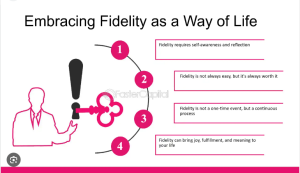
Fidelity is a term that encompasses loyalty, faithfulness, and unwavering commitment. Whether in personal relationships, business, finance, or technology, fidelity plays a crucial role in maintaining trust and integrity. In this article, we will explore the multifaceted meaning of fidelity, its relevance in various domains, and why it remains a vital concept in today’s ever-evolving world.
What is Fidelity?
At its core, fidelity refers to the quality of being faithful or loyal. The term originates from the Latin word fidelitas, which means faithfulness or allegiance. In everyday use, fidelity can describe the loyalty of a person to a partner, the accurate reproduction of sound or images, or the commitment to principles and responsibilities.
Common Definitions of Fidelity:
- Personal Relationships – The unwavering loyalty and faithfulness to a partner in a romantic or marital context.
- Technology – The degree to which a system reproduces a signal accurately (e.g., high-fidelity audio).
- Finance – The integrity and reliability of a financial institution, such as Fidelity Investments.
- Workplace Ethics – Loyalty to an organization or adherence to a professional code of conduct.
Fidelity in Personal Relationships
One of the most discussed forms of fidelity is in the context of romantic relationships. Here, fidelity signifies emotional and sexual exclusivity. Being faithful to one’s partner is considered a cornerstone of a healthy and lasting relationship. Infidelity, on the other hand, often leads to emotional distress, broken trust, and even the end of relationships.
Why Is Fidelity Important in Relationships?
- Trust Building: Fidelity strengthens trust between partners, creating a safe emotional environment.
- Emotional Stability: Knowing that your partner is faithful provides emotional security and reduces anxiety.
- Long-Term Commitment: Fidelity fosters long-term commitment and shared growth.
Ways to Promote Fidelity:
- Open communication
- Setting mutual expectations
- Emotional honesty
- Resolving conflicts constructively
Fidelity in Business and the Workplace
In the business world, fidelity means loyalty and ethical conduct. Employees and employers alike are expected to uphold standards of trust and professionalism. A high level of workplace fidelity leads to strong organizational culture, reduced employee turnover, and improved performance.
Fidelity in the Workplace Includes:
- Confidentiality: Keeping company secrets and private information secure.
- Loyalty: Supporting your organization and its goals.
- Integrity: Acting ethically and responsibly, even when unsupervised.
Employers value employees who show high fidelity through dependability, responsibility, and respect for workplace values.
Fidelity in Technology and Media
In the realm of technology and media, fidelity refers to the accuracy with which a system reproduces data. High fidelity (hi-fi) systems, for instance, aim to produce sound or visuals that are as close to the original as possible. Whether it’s a music system or a virtual reality experience, high fidelity equates to a more immersive and true-to-life experience.
Examples:
- Audio Systems: High-fidelity speakers deliver crisp, clear, and realistic sound.
- Virtual Reality: Hi-fi VR environments simulate real-world conditions for training, gaming, or education.
- Image Rendering: High fidelity in graphics ensures accurate color and detail representation.
In this context, fidelity translates to quality and performance — a critical factor in user satisfaction.
Fidelity in Finance: Fidelity Investments
When most people hear the word “fidelity” in the financial world, they often think of Fidelity Investments, one of the largest and most trusted investment firms in the world. Founded in 1946, Fidelity Investments provides a wide range of financial services, including retirement planning, brokerage services, wealth management, and mutual funds.
Why Fidelity Investments is Trusted:
- Track Record: Over seven decades of consistent service.
- Transparency: Clear reporting and open client communication.
- Customer Support: Strong customer service and educational resources.
- Innovation: Cutting-edge technology and mobile accessibility.
Fidelity Investments lives up to its name by being faithful to clients’ financial goals, embodying the very essence of the word.
Fidelity and Ethics
On a broader scale, fidelity is one of the core ethical principles in many moral and professional codes. Whether in healthcare, law, or education, fidelity means staying true to one’s duty, respecting confidentiality, and being committed to the well-being of others.
Examples of Ethical Fidelity:
- Doctors and Nurses: Upholding patient confidentiality and care standards.
- Teachers: Being loyal to students’ best interests and maintaining integrity in assessments.
- Lawyers: Protecting client interests with loyalty and discretion.
In all these roles, fidelity ensures trust, accountability, and credibility.
The Psychological Impact of Fidelity
Fidelity isn’t just a social expectation—it also has psychological implications. Being faithful and receiving fidelity in return creates emotional stability and mental peace. People who experience fidelity in relationships and workplaces often report:
- Higher life satisfaction
- Reduced stress levels
- Better interpersonal relationships
- Increased self-worth
On the flip side, breaches of fidelity can lead to trauma, anxiety, and prolonged mistrust in future relationships or work environments.
How to Cultivate Fidelity in Your Life
Developing and maintaining fidelity requires conscious effort and self-awareness. Here are some tips to cultivate fidelity in different areas of your life:
- Personal Integrity: Be honest with yourself and others.
- Communication: Keep lines of communication open, especially in relationships.
- Accountability: Take responsibility for your actions.
- Consistency: Be dependable and keep promises.
- Respect: Value the people and institutions you are loyal to.
By practicing these habits, you not only promote fidelity but also become a trustworthy individual in your personal and professional circles.
Conclusion
Fidelity is more than just a word—it’s a foundational value that touches every aspect of our lives. Whether it’s remaining loyal in relationships, maintaining ethical standards in the workplace, delivering high-quality technology, or managing finances with trust, fidelity is what binds us together and builds a strong, reliable society.
In an age where loyalty is often tested, and distractions are abundant, the importance of fidelity cannot be overstated. Upholding fidelity helps preserve trust, stability, and authenticity — values that are essential for thriving in any personal, professional, or digital space.